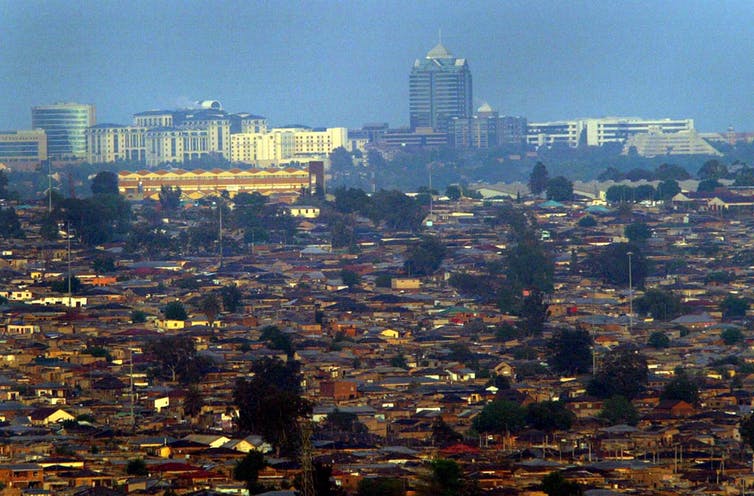A short-term action plan includes an extensive clean-up campaign, fixing sewerage spillage, and addressing the proliferation of illegal structures.

A view of Sandton City, the richest square mile in Africa, towering over impoverished Alexandra township, in Johannesburg. Picture: EPA / Kim Ludbrook
The service delivery problems in Alexandra township are receiving the highest attention of the inter-ministerial task team (IMTT) on service delivery that was appointed by President Cyril Ramaphosa in the wake of Alexandra protests in February.
Deputy Minister of Cooperative Governance and Traditional Affairs (Cogta) Obed Bapela told the SA Human Rights Commission’s (SAHRC) Alexandra inquiry yesterday that some of the key challenges identified by the IMTT in the township included land ownership disputes, land availability for development, local governance issues, unemployment, limited development impact and internal tensions.
“The team engaged with the office of the premier, the mayor’s office as well as business and property owners in Alexandra to get their input,” said Bapela.
He said that the overcrowding and congestion in the township was a result of “rapid urbanisation”, where people were moving into Alex in search of job prospects, which resulted in the mushrooming of informal settlements on river banks and other undesignated areas.
“If we are to solve the many problems of Alexandra, particularly the old Alexandra, we need to decongest it.
“The solution is to give title deeds to current occupants, partner with property owners and ensure basic services are delivered,” Bapela said.
The SAHRC’s Buang Jones said the aim of the inquiry was to find the causes behind the protests. The commission will also establish if the City of Joburg had engaged meaningfully with the residents of Alexandra and monitored the situation of housing to ensure that urgent and emergency housing was given to the affected parties, among other things.
The IMTT’s approach, which encompasses liaison with the three spheres of government to solve the service delivery crises in Alexandra, includes a short-term action plan to address the immediate basic service delivery issues.
They will embark on an extensive clean-up campaign, fix sewerage spillage into the streets, address the proliferation of illegal shacks and other structures that are contravening municipal bylaws, as well as address the high crime rate and the proliferation of illegal weapons used in robberies and murders.
“Parallel to this process, a medium-term plan is proposed to be developed in partnership with communities, the private sector, research institutions and government,” said Cogta. “In this plan, we want to use Alexandra and its surrounding areas as a model to develop a post-apartheid city, using existing frameworks such as the integrated urban development framework, the National Development Plan, the Gauteng spatial development framework and the municipal spatial development framework.”
The IMTT comprises various ministries, such as the ministers and deputy ministers of cooperative governance and traditional affairs; human settlements, water and sanitation; environmental affairs; police; small business development; and home affairs, as well as rural development and land reform, among others.
“It is critical for all spheres of government to cooperate and work in an integrated manner to promote efficient service delivery and move forward guided by our integrated urban development framework that will obliterate past apartheid spatial planning,” said Cooperative Governance and Traditional Affairs Minister Zweli Mkhize, following Ramaphosa’s call to set up the IMTT on service delivery.
– news@citizen.co.za
For more news your way, download The Citizen’s app for iOS and Android.
Download our app